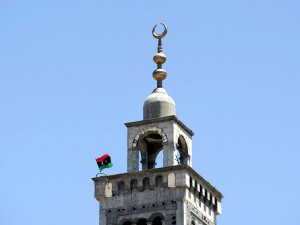First ship evacuates Filipinos, other foreigners from war-torn Tripoli
TRIPOLI—More than 200 foreigners, including Filipinos, were evacuated Thursday on the first International Organization for Migration boat to dock in war-torn Tripoli, as relief mixed with sadness for many of those leaving.
The boat left with between 200 and 250 passengers on board, said the IOM spokeswoman in Geneva, Jemini Pandya.
The IOM said the vessel would arrive in the eastern city of Benghazi on Saturday and the migrants then transported to the Egyptian border at Salloum before being helped to return to their home countries.
Gleeful children played on the oily wooden deck as their parents piled bags on pallets before the ship left.
“I’m happy to go home to the Philippines,” said nine-year-old Arjan, whose mother worked at Tripoli’s main hospital. “I was frightened by all of the bang-bang.”
The boat, which had waited offshore for two nights for the security situation to improve as rebels battled Moammar Gadhafi loyalists around the capital, was taking Filipinos, Egyptians, Canadians, Algerians and Moroccans.
A handful of Filipinos were the first to board, their names noted and passports checked. Some were happy, some sad, but all were relieved.
Construction foreman Ramil Nyala, 45, complained that he was leaving Libya empty-handed, without the precious remittances that are key to the Filipino economy.
“I was being paid $600 to $800 a month. It’s high. But they refused to pay me. I haven’t had work for four months, and I have to pay $350 a month in rent, so my savings are all lost,” he said.
“All the stores closed a few days ago, and even if you have money, Libyans are the priority. We couldn’t sleep at night because of the shooting everywhere. I’m happy to go and join my family.”
Dr. Yussef Biuk asked those who boarded if they had any diseases or special medical needs for the journey, and gave everyone a seasickness pill.
The chartered Turkish ship, a river ferry, was expected to make the journey in 36 hours instead of the usual 20.
The ship only has four cabins, so most people will make the journey sitting down, armed with the food packages they’ve been given.
“We’re two doctors on board, so I might stay behind to treat people at the hospital. I have friends and relatives here,” Biuk said earlier as the smell of diesel filled the air.
Some of those fleeing Libya said they intend to return “after a holiday” while others were leaving their entire lives behind.
“I’m not sad to leave because I’m coming back,” said fire alarm engineer William Doctor. “I have my exit and entry visa, so I’ll be back in November. Now I’m going to have a little holiday,” he smiled.
Julie, whose husband worked as a “senior production coordinator”, said she was sad to leave after living in the country since 1982, almost half her life, because “we love Libya.”
“I love the life, the weather, the money,” she said. “The standard of living is better than in the Philippines. Here we have money, we don’t need to cook,” she said.
“Our children were born and studied here, they speak Arabic and they want to come back.”
Martin Jerrett, IOM head of office in Benghazi, said the ship aimed to spread the message that foreigners could get out.
“This journey is to establish our presence, there will be bigger boats coming tomorrow and in two days time, each for 1,000 people,” he said.
“We’re concerned about sub-Saharan Africans because of the perception that they’re mercenaries (working for Moamer Kadhafi). They’re the most frightened and least likely to move.”
Egyptian consul Mohammed Zeid, however, said an exodus of his country’s nationals was expected to ease.
“We have at least 100,000 Egyptians in western Libya, and they’ve all said they want to leave. I’m expecting a lot of them to change their minds because of recent developments, but it’s too early to say how many.”
